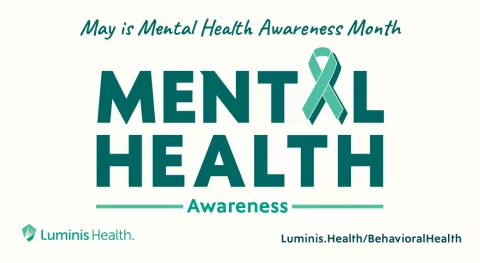by Luminis Health

When the COVID-19 virus emerged in early 2020, we never imagined we’d be living in a masked, socially distanced world almost a year later. The changes to our lives — working and schooling from home, unemployment, limited contact with family and friends — have been challenging.
Today, breakthrough vaccines offer hope for a return to “normal.” But continued spikes in positive cases of COVID-19 confirm the need to stay hunkered down to reduce the spread. Although there’s no doubt quarantining reduces the risk of spreading the virus, it can be tough on our mental health. Whether you’re locked down as part of a local or state-wide effort, quarantining after being exposed to someone with the virus — or choosing on your own to avoid people, possible exposure and spreading the virus — these tips can help you care for your mental health.
- Stick to a routine
For millions of people, quarantine has meant working and going to school from home. The need to juggle client meetings over Zoom, walk your fifth-grader through dividing fractions and ignore the pull of all-day access to “Law and Order” reruns can make maintaining a routine seem unreachable.
When so much is out of our control, maintaining a routine helps you manage anxiety and feel more in control. Routine also helps reduce “decision fatigue,” and the overwhelming feeling you can get from having too many options.
While your pre-pandemic routine of heading off to work or school may be a thing of the past, you can establish a new—more flexible—routine. Try to maintain regular schedules for working, schooling, relaxing, eating and sleeping. Designate specific work areas as best you can to help you focus when you need to and relax when you don’t.
- Take care of your body
Eating nutritious foods, exercising regularly and getting plenty of sleep can not only help you stay physically healthy, they boost your mental health, too. Although a steady diet of Netflix, chips and cookie-baking can feel like good medicine if you’re feeling down, they can leave you feeling worse long term if you don’t limit them to a special treat.
Make sure to get healthy, daily doses of vegetables, fruits, whole grains, seafood and lean proteins. Also include physical activity every day, whether it’s bundling up for a brisk walk outside or taking advantage of the thousands of exercise options available online for free.
- Connect with others
The pandemic may be keeping us physically apart from family and friends, but technology can help you close the gap. Make a list of family, friends, co-workers you can connect with. Work your way through the list with a daily phone call, text, video chat, or even an old-school hand-written letter to someone. You’ll maintain relationships, get support and offer support, too.
- Take breaks from the news
Access to news 24/7 when you’re isolated can be addicting. Add social media commentary, and you have a recipe for fear and anxiety. It’s important to stay informed, but you need to find the sweet spot of being up to date on what you need to know without feeling overwhelmed. Limit your time to 20 minutes, once or twice a day. Follow trusted news sources and gather advice and information from national and local health and government authorities.
- Practice mindfulness
Mindfulness is focusing on the present moment. That means ignoring the pull to worry about “what-if’s” in the future or beat yourself up over “why-didn’t-I’s” of the past. Meditation, yoga and prayer, or even taking time to focus on a single breath, can help reduce stress and shut down unproductive thoughts.
- Be kind to yourself
Despite your best efforts to do everything right, there will be days when it all falls apart, with Disney+ marathons, Netflix bingeing or empty junk food bags leaving you feeling like a failure.
When it does, give yourself a break. Perfection isn’t realistic, especially during a pandemic. Remember, you’re not alone. Millions of people around the world are like you — trying to make the best of a tough situation. Being mad at yourself doesn’t do any good. In fact, the best way to get back on track may even be an impromptu dance party and ice cream for lunch.
Ask for help when you need it
By now, we all know how challenging quarantining can be. You may find yourself feeling overwhelmed despite your best efforts. The Centers for Disease Control says these common signs of distress signal you may need help:
- Changes in sleep or eating patterns
- Difficulty sleeping or concentrating
- Fear and worry about your own health and the health of your loved ones, your financial situation or job, or loss of support services you rely on
- Increased use of tobacco or alcohol and other substances
- Worsening of chronic health problems
- Worsening of mental health conditions
Don’t wait to get help. Talk with your primary care doctor or reach out to AAMG Mental Health Specialists.
 Jennifer Williams, MA, LPC, LCPC, is a mental health professional at Anne Arundel Medical Group (AAMG) Mental Health Specialists, located in Annapolis. To reach her, call 410-573-9000.
Jennifer Williams, MA, LPC, LCPC, is a mental health professional at Anne Arundel Medical Group (AAMG) Mental Health Specialists, located in Annapolis. To reach her, call 410-573-9000.



